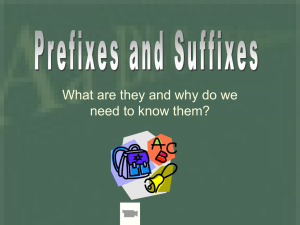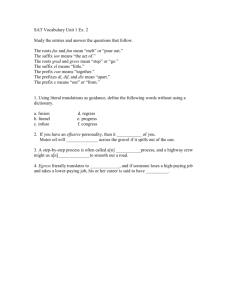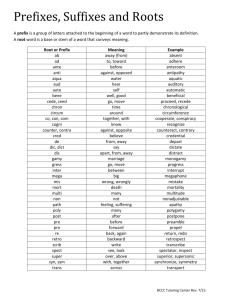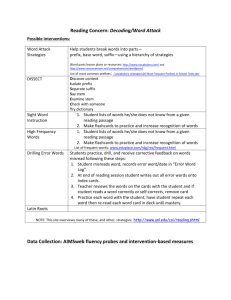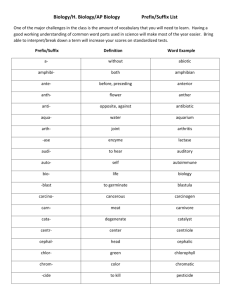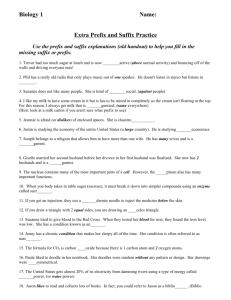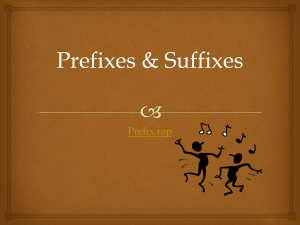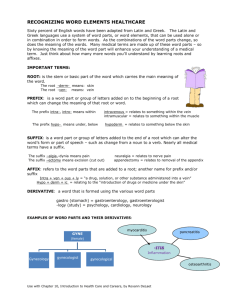Vocab. List 1: Prefixes
advertisement
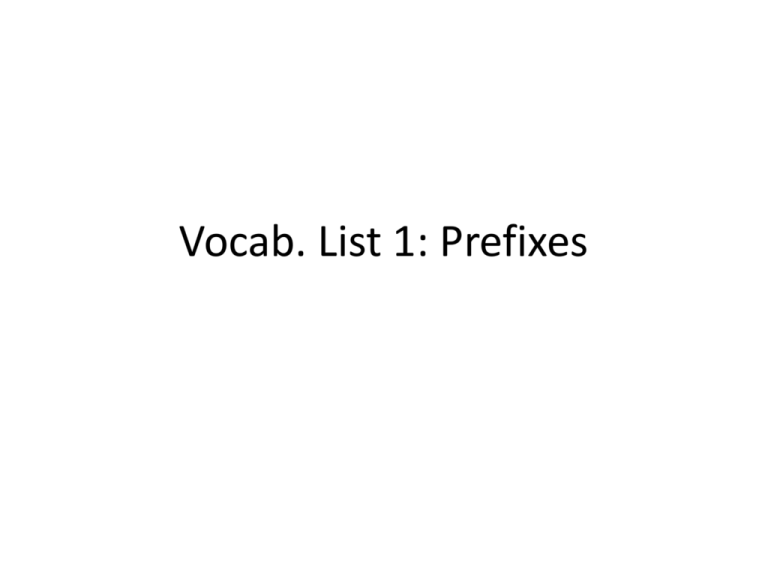
Vocab. List 1: Prefixes #1 1. antecedent- going before in time – Prefix: ante (before) 2. antipathy- revulsion, any object of strong dislike – Prefix: anti (against) 3. Circumvent- to go around; to catch in a trap; to gain superiority over; to prevent from happening – Prefix: circum/circ (around) #2 4. consensus- agreement, especially in opinion – Prefix: con (with, together) 5. controversy- a discussion of a question in which opposing views clash – Prefix: contr (against) 6. decimate- to destroy or kill a large portion of something; to take or destroy a tenth part of something – Prefix: dec (ten) #3 7. demote- to lower in grade or position – Prefix: de (down, away from) 8. disinterested- not motivated by personal interest or selfish motives – Prefix: dis (not, opposite of) 9. euphemism- the use of a word or phrase that is considered less distasteful or offensive than another – Prefix: eu (good, well) #4 10. exorbitant- going beyond what is reasonable and proper – Prefix: ex (out of, away from) 11. illegible- not able to be read – Prefix: il (not, opposite) 12. intermittent- stopping and starting again at intervals – Prefix: inter (between) #5 13. malevolent- having an evil disposition toward others – Prefix: mal (bad) 14. precursor- a forerunner, one who or that which comes before – Prefix: pre (before) 15. prognosis- a forecast; especially in medicine – Prefix: pro (before) #6 16. retrospect- looking back on or thinking about things past – Prefix: retro (back, again) 17. subordinate- (1)inferior to or placed below another in rank, power, or importance. (2) a person or thing of lesser power or importance than another. (3) to treat as inferior or less important. – Prefix: sub (under) #7 18. synthesis- putting two or more things together to form a whole – Prefix: syn, sym (with or together) 19. transcend- to go beyond the limits of; to overstep; to exceed – Prefix: trans (across) 20. trivial- of little worth or importance – Prefix: tri (three) Vocab. List 2: Suffixes #1 1. agrarian- having to do with agriculture or farming – Suffix: -ian (one who is or does) 2. antagonist- one that contends with or opposes another – Suffix: -ist (one who) 3. bigotry- unreasonable zeal in favor of a party, sect, or opinion – Suffix: -ry (state of) #2 4. consummate- to complete, to carry to the utmost degree – Suffix: -ate (to make) 5. copious- abundant; plentiful; in great quantities – Suffix: -ious (having the quality of) 6. cryptic- hidden; secret; having a hidden or ambiguous meaning – Suffix: -ic (causing) #3 7. deferment- the act of putting off or delaying; postponement – Suffix: -ment (quality of) 8. furtive- done in a stealthy manner; sly and underhanded – Suffix: -ive (having the nature of) 9. laudable- praiseworthy – Suffix: -able (capable of) #4 10. geology- the study of the history of the earth and its life, especially as recorded in rocks – Suffix: -ology (study of) 11. minimize- to play down; to keep to a minimum – Suffix: -ize (to subject to an action) 12. mutation- the act or process of changing – Suffix: -tion (action of, state of) #5 13. obsolescence- the state of being outdated – Suffix: -escence (state of) 14. parity- the state or condition of being the same in power, value or rank; equality – Suffix: -ity (state of being) 15. pragmatism- faith in the practical approach – Suffix: -ism (state or doctrine of) #6 16. provocative- something that stirs up an action – Suffix: -ive (having the nature of) 17. puerile- childish, silly, immature – Suffix: -ile (pertaining to) 18. rectify- to make right; to correct – Suffix: -ify (to make) #7 19. relentless- harsh; unmoved by pity; unstoppable – Suffix: -less (without) 20. venerate- to look upon with deep respect and reverence – Suffix: -ate (to make) Vocab. List #3: Learning Roots #1 1. agonize- to suffer intense pain, to struggle over something – Root: agon (struggle, contest) 2. audible- able to be heard – Root: aud (hear) 3. belligerent- warlike, hostile – Root: bell (war) #2 4. chronic- constant, habitual – Root: chron (time) 5. demographic- statistical characteristics of human population, such as age or income – Root: dem (people) 6. fidelity- faithfulness – Root: fid (faith) #3 7. fluctuate- to move up and down, constantly changing – Root: flux, flu (to flow) 8. genocide- the deliberate extermination of an entire group of people – Root: gen (race or kind) 9. incognito- disguised, unrecognizable – Root: cog, gno (to know) #4 10. inducement- motive, leading to an action, incentive – Root: duc (lead) 11. interrogate- to question – Root: rog (to ask) 12. loquacious- talkative – Root: loq (speak) #5 13. nominal- in name only, a small amount – Root: nom (name) 14. pathos- suffering; feeling of sympathy or pity – Root: path (feelings) 15. protracted- drawn out in time, prolonged – Root: tract (draw; pull) #6 16. rejected- sent back, refused, discarded – Root: ject (to throw or send) 17. sophisticated- knowledgeable; refined, experienced, and aware – Root: soph (wisdom) 18. tenacious- unwilling to let go, stubborn – Root: ten (hold) #7 19. verify- to establish as truth, confirm – Root: ver (truth) 20. vivacious- lively in manner – Root: viv (life) Vocab. List #4: More Roots #1 1. agoraphobic- fear of open or public spaces – Root: phobe (fear) 2. assimilate- to fit in – Root: simul (copy) 3. attribute- a special quality – Root: trib (to give) #2 4. benevolent- kind, having goodwill – Root: ben (good) 5. biodegradable- able to be broken down by living things – Root: bio (life) 6. conspicuous- highly visible – Root: spic, spec (see) #3 7. contradiction- the act or state of disagreeing – Root: contra (against) – Root: dict (say) 8. credence- belief, believability – Root: cred (believe) 9. evident- obvious – Root: vid (see) #4 10. gregarious- sociable – Root: greg (crowd) 11. impediment- a barrier or hindrance – Root: ped, pod (foot) – Root: ped (child) 12. incisive- penetrating, clear cut – Root: cis, cid (to cut) #5 13. inference- guess or surmise – Root: fer (bear or carry) 14. mediocre- of medium quality, neither good nor bad, average – Root: med (middle) 15. philanthropy- giving generously to worthy causes – Root: phil (love) #6 16. precedent- a prior ruling or experience – Root: ced (go) 17. recapitulate- to review in detail – Root: cap (head) 18. remittance- payment, transmittal or money – Root: mit, mis (to send) #7 19. tangential- touching slightly, relating to – Root: tang, tac, tig (touch) 20. urbane- polished, sophisticated – Root: urb (city) Vocab. List 5: Foreign Language Terms Used in English #1 1. aficionado- a person who likes, knows about and is devoted to a particular activity or thing 2. avant-garde- (1)a group of people who develop innovative and experimental concepts, especially in the arts. (2) relating to a group of people who develop innovative and experimental concepts, especially in the arts. #2 3. blasé- apathetic to pleasure or excitement as a result of excessive indulgence in something 4. bourgeois- having the attributes and beliefs of the middle class, marked by materialistic concerns 5. cliché- a phrase or saying which has been overused and as a result has little significance or meaning #3 6. debut- a first appearance 7. élan- spirit, enthusiasm, or excitement 8. entrepreneur- a person who takes on the challenge and risk of starting his or her own business #4 9. epitome- an exact example of something; someone or something that embodies the essence of a concept or type 10. fait accompli- something that is complete and seemingly irreversible 11. gauche- lacking social graces or sophistication #5 12. imbroglio- a complicated or embarrassing situation due to a misunderstanding 13. ingénue- a young girl or woman, an actress playing such a role 14. laissez-faire- a doctrine opposing government control of economic matters except in a case of maintaining peace and the concept of property #6 15. malaise- the vague feeling of illness 16. naïve- innocent, simple, lacking knowledge of the world 17. non sequitur- a statement that has no connection to the previous statement or idea #7 18. rendezvous- a meeting place 19. vendetta- a grudge or feud characterized by acts of retaliation 20. vignette- a short descriptive written piece Vocab. List #6: Business Terms #1 1. arbitrage- the buying of “paper”—stocks, bonds, and securities—to resell for a quick profit 2. arbitration- the process by which disputes are settled by a third party 3. beneficiary- one who will benefit from something #2 4. capital- accumulated wealth, used to gain more wealth 5. collusion- a secret agreement for a deceitful or fraudulent purpose, conspiracy 6. consortium- a joining of two or more businesses for a specific purpose #3 7. deduction- the subtraction of a cost from income 8. discrimination- the act of making distinctions, the act of distinguishing between one group of people and another and treating people differently as a result, prejudiced actions or treatment #4 9. entitlement- special privilege or benefit allowed to a group of people 10. equity- fairness or evenness of treatment, or the value of property after all claims have been made against it 11. exempt- excused from some rule or job #5 12. fiscal- pertaining to money or finance 13. franchise- a business that is owned by a parent company but run by independent operators under rules set out by the parent company 14. harassment- the act of harassing someone, annoy or irritate persistently #6 15. jargon- the specialized vocabulary of an industry or interest group 16. nepotism- the employment or promotion of friends and family members 17. perquisite- a privilege or bonus given in addition to regular salary #7 18. prospectus- a published report of a business and its plans for a program or offering 19. subsidy- a grant of money for a particular purpose 20. tenure- the state or period of holding a particular position, or a guarantee of employment to teachers who have met particular standards Vocab. List 7: Technology Terms #1 1. application- a software program that lets you complete a task on your computer, such as word processing, listening to music, or viewing a Web page 2. bandwidth- the amount of information that one can send through a connection, usually measured in bits per second #2 3. bitmap- the representation in rows and columns of dots of an image in computer memory 4. cache- a high-speed storage mechanism that allows a computer to store frequently accessed information locally #3 5. cookie- a message given to a Web browser by a Web server that is stored in the browser and sent back to the server every time the browser contacts the server for a Web page 6. cursor- a symbol, usually a blinking line that shows where the next letter will be typed on a computer screen #4 7. database- information stored and organized so that a computer can quickly retrieve selected pieces of information 8. download- the process of copying a document or file from an online source to your own computer 9. encryption- the translation of information into a secret code #5 10. Ethernet- a common method of enabling computers in the same Local Area Network to communicate with each other 11. firewall- a system that prevents unauthorized access to and from a private network 12. information technology (IT)- the broad subject of anything concerning processing or managing information, especially in a large company #6 13. keyword- a word that specifies a particular record, file; in programming a specific command 14. motherboard- the main circuit board of a computer 15. network- a group of two or more computers linked together #7 16. plug-in: a piece of hardware or software that adds a specific feature to a larger, already existing system 17. search engine- a program that searches documents, websites, and databases for a keyword and then provides a list of those documents #8 18. server- a computer on a network that manages network resources 19. upload- the opposite of download; to transmit documents from your computer to an online source 20. workstation- a type of computer that has enough power to run applications used in work environments Vocab. List 8: Legal Terms #1 1. abrogate- to abolish by authoritative action 2. adjudicate- to act as a judge, to settle judicially 3. appellate- having the power to review judgment of another court 4. affidavit- a sworn statement in writing made under oath #2 5. bequest- the act of bequeathing, the act of leaving someone/something in a will, something that is bequeathed 6. contraband- illegal or prohibited exporting or importing of goods 7. deposition- testimony under oath, taken down in writing #3 8. exhume- to remove from a grave; to bring back from neglect or obscurity 9. extradite- to surrender an alleged criminal to the state or country in which he or she can be tried 10. intestate- one who dies without a will #4 11. ipso facto- by the very fact or act, an inevitable act 12. larceny- the unlawful taking of someone else’s property with the intention of not giving it back 13. lien- a charge against real or personal property for the satisfaction of a debt or duty originally arising from the law #5 14. litigious- contentious situation, prone to litigation 15. jurisprudence- a system of laws, the science of philosophy of the law 16. malfeasance- wrongdoing or misconduct especially by a public official 17. perjury- lying or intentionally omitting information under oath #6 18. plagiarism- the act of passing of someone else’s work as your own 19. sanction- authoritative permission or approval that makes a course of action valid, a law or decree 20. tort- wrongdoing for which damages can be claimed; an unintentional violation of someone’s rights, which can result in civil action but not criminal proceedings Vocab. List 9: Terms Relating to Language and Literature #1 1. anecdote- a short account of an interesting or humorous incident 2. anthropomorphism- attribution of human motivation, characteristics, or behavior to inanimate objects, animals, or natural phenomena 3. archetype- an original model or type after which other similar things are patterned; an ideal example of a type #2 4. aphorism- a brief statement of a truth or opinion; a saying or an adage 5. construe- to explain the meaning of; interpret; to analyze the grammatical structure of a sentence 6. deduce- to reach a conclusion of reasoning; to infer from a general principle; to trace the origin of #3 7. epigram- a short, witty poem expressing a single thought or observation; a concise, clever, often paradoxical statement or saying 8. etymology- the origin and historical development of a word’s forms, meanings and usages 9. infer- to conclude or reason from evidence, premises, or circumstance; to hint or imply #4 10. irony- the use of words to express something different from, and often opposite to, their literal meaning; a literary style employing such contrasts for witty effect; incongruity between what might be expected and what actally occurs 11. onomatopoeia- the formation or use of words such that imitate the sounds associated with the objects or actions to which they refer #5 12. personification- a person or thing typifying a certain quality or idea; an embodiment or exemplification; a figure of speech in which inanimate objects or abstractions are endowed with human qualities or are represented as possessing human form #6 13. perspective- a mental view or outlook; a point of view; the ability to perceive things in their actual interrelations or comparative importance 14. protagonist- the main character in a drama or other literary work 15. prose- ordinary speech or writing, without metrical structure (as in poetry) #7 16. pun- play on words 17. rhetoric- the art or study of using language effectively and persuasively 18. satire- a literary work in which human vice or folly is attacked through irony and wit #8 19. soliloquy- a dramatic or literary form of discourse in which a character talks to himself or herself or reveals his or her thoughts without addressing a listener 20. trite- lacking power to evoke interest through overuse or repetition Vocab. List 10: Short Words That Mean A Lot #1 1. acme- the highest point, as of achievement or development 2. awry- in a position that is turned or twisted toward one side or away from the correct course; askew 3. bane- fatal injury or ruin; a cause of harm, ruin, or death; a source of persistent annoyance or exasperation #2 4. cite- to quote as an authority or example 5. crux- the basic or central point or feature; a puzzling or apparently insoluble problem 6. dire- warning of, or having dreadful or terrible consequences; urgent; desperate 7. dupe- an easily deceived person #3 8. eke- to supplement or get with great effort; to make last by practicing strict economy 9. elite- a group or class of persons or a member of such a group or class, enjoying superior intellectual, social, or economic status; the best or most skilled members of a group 10. gibe- to make taunting, heckling, or jeering remarks #4 11. maim- to disable or disfigure; to make imperfect or defective; impair 12. mete- to distribute by or as if by measure; allot 13. moot- a hypothetical case argued as an exercise; a case no longer of actual significance #5 14. oust- to eject from a position or place; force out 15. purge- to free from impurities; purify; to rid of sin, guilt, or defilement; to clear a person of a charge; to get rid of people considered undesirable #6 16. roil- to make a liquid muddy or cloudy by stirring up sediment; to displease or disturb; vex 17. sham- something false or empty that is said to be genuine; one who assumes a false character; an impostor 18. staid- characterized by sedate dignity and propriety; sober, fixed; permanent #7 19. veer- to turn aside from a course, direction, or purpose; swerve 20. vie- to strive for superiority; compete, rival
